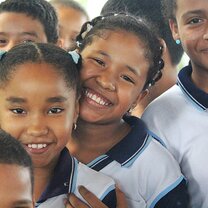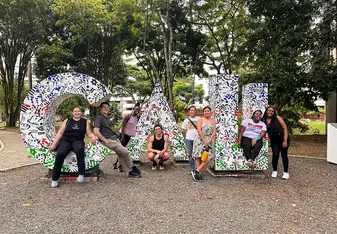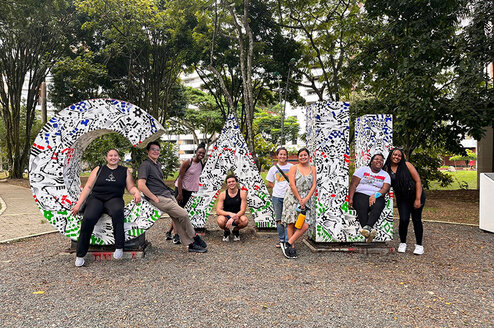Custom Service-Learning program in Chinchiná Colombia
- Colombia
About Program
Learn and serve in the beautiful and bio-diverse coffee growing region of Chinchiná. Include Medellin and Cartagena for short excursions. Be prepared for a lush experience! This UNESCO Heritage city is nestled in an high Andean valley and is surrounded by coffee fincas.
Include exciting and relevant courses that give a true picture of Colombia like Spanish language & culture, Community Organizing, Social Activism and Service-Learning, Service Learning Reflections and Practicum as well as elective courses centered on Race and Racism, Development in Post-Conflict Societies, Afro-Caribbean Studies, Historical Perspectives on Modern Colombia and Conflict, Peace and Reconciliation.
There are substantial opportunities for volunteer service in schools and clinics focusing on displaced persons, the peace process in post-conflict areas, animal welfare, home building and education to name a few.
Students live in an NGO communal home. Most meals are provided and prepared for you.
Video and Photos
Diversity & Inclusion 💙
BIPOC Support
LGBTQIA+ Support
Neurodivergent Support
Accessibility Support
Impact 🌎
Sustainability
Ethical Impact
Program Highlights
- Experience Chinchiná in the heart of the coffee growing region of Colombia
- Include excursions to Medellín and Cartagena
- Learn and serve in the beautiful and bio-diverse coffee growing region of Chinchiná
- Volunteer Service that addresses REAL human needs! Support human rights defenders & social leaders. Examine existing public policies, laws relating to human rights. Work with organizations that address Animal Welfare; Education; Displaced Persons; etc.
- IPSL, the founder of Service-Learning, is a global education institute within Westminster University. They invest over 83% of their revenues directly back into the communities where they serve.


















Response from IPSL Global Engagement at Westminster University
IPSL appreciates the feedback and the opportunity to respond. We hope that this talented individual has the same opportunity to provide such feedback to their home university and, in particular, to their home university’s advising team.
IPSL is familiar with this participant's feedback. With every participant, we request an evaluation upon completion. We received these comments in writing a few months after the request and shared these in a meeting with our team. So, while the content of this review is familiar to us and was/is being addressed, we appreciate that this participant is sharing her ideas more broadly and for the opportunity for IPSL to respond.
As with all under-resourced organizations (and our partner in La Boquilla is one of those), priorities can, and do, shift daily. Our partner has limited human resources to accomplish their mission. The members all have full-time jobs and other obligations to sustain their lives. This is the nature of nonprofit/NGO/grassroots work across the globe and provides an excellent training ground for individuals interested in entering the field of nonprofit work. That said, the organization where they did their service was somewhat new to IPSL and there were/are kinks to iron out. All that said, our partners reported that the student, on more than one occasion, did not show up to pre-scheduled meetings; that is likely part of the reason there was increased room for ‘misinformation’.
The observation that the organization has a ‘leadership’ issue is excellent and accurate. We have encouraged them to work on this which we all believe could potentially help them accomplish more of their mission.
Regarding excursions, ideally, they are spread out throughout a program – or during the period a course is being taught. That said, IPSL never promises when excursions will happen and, in fact, we mention explicitly that excursions can change due to circumstances beyond our control (closures, roads washing out in rainy seasons, etc.). But we always replace a cancelled excursion with another, complementary one. We have spoken with the leadership at our partner in La Boquilla and we addressed issues around communication and the Orientation Tour. But as mentioned above, ‘no-shows’ on the part of students/participants send a message that the participant is uninterested.
IPSL does an excellent job of preparing students/participants for the differences in cultures, including gender and race relations in different program locations. What a participant interprets as misogynistic may, indeed, be misogynistic through their own cultural lens, but it may also be a cultural issue or, again, a function of not having the capacity/time to address an issue in the moment. IPSL’s community-based organizations abroad are routinely some of the most resource-scarce groups addressing the most pressing needs in their communities. There is plenty of opportunity to observe, assess, design interventions/programs, present findings, and/or simply bear witness and serve. It is the participant’s particular framework through which they view the situation that contributes – or not – to the support of the organization’s
mission. We are not sure how the air conditioner issue is an example of misogynistic behavior, but we do know that the AC issue was addressed to the satisfaction of the roommate.
Any successful project and/or placement in an IPSL partner requires that all three legs of the three-legged stool do their part. IPSL never promised a formal course on project management. Indeed, the course/fieldwork was the sole responsibility of the participant’s home university.
The participant was approved and selected for this placement precisely due to their military background in managing people and projects. A key piece of what was missing from this participant’s academic experience was the home university advisor who was completely missing-in-action from the student’s entire fieldwork placement experience. There was no support from the very individuals responsible for the required outcomes. IPSL did not (and cannot) assume the role of a participant’s home university advisor in such situations. Yes, there were issues with some of the on-the-ground experiences that were IPSL’s responsibility, and we did what we could to address those issues as soon as humanly possible. What IPSL cannot do – and won’t take responsibility for – is a home institution’s lack of support for their own student.
The participant’s statement that IPSL as a company only wanted their money and fooled them into their participation is sadly untrue. The participant was approved and selected, for this placement, precisely due to their military background in managing people and projects. All the necessary preparations were made in advance and when the inevitable issues arose (as they always do), IPSL did what it could to address them. IPSL is pleased that the participant acknowledges the contributions of our Veteran staff member; we appreciate this. Lastly, IPSL is a nonprofit organization; we are not a company and over 80% of our revenues are reinvested in the various communities we serve.